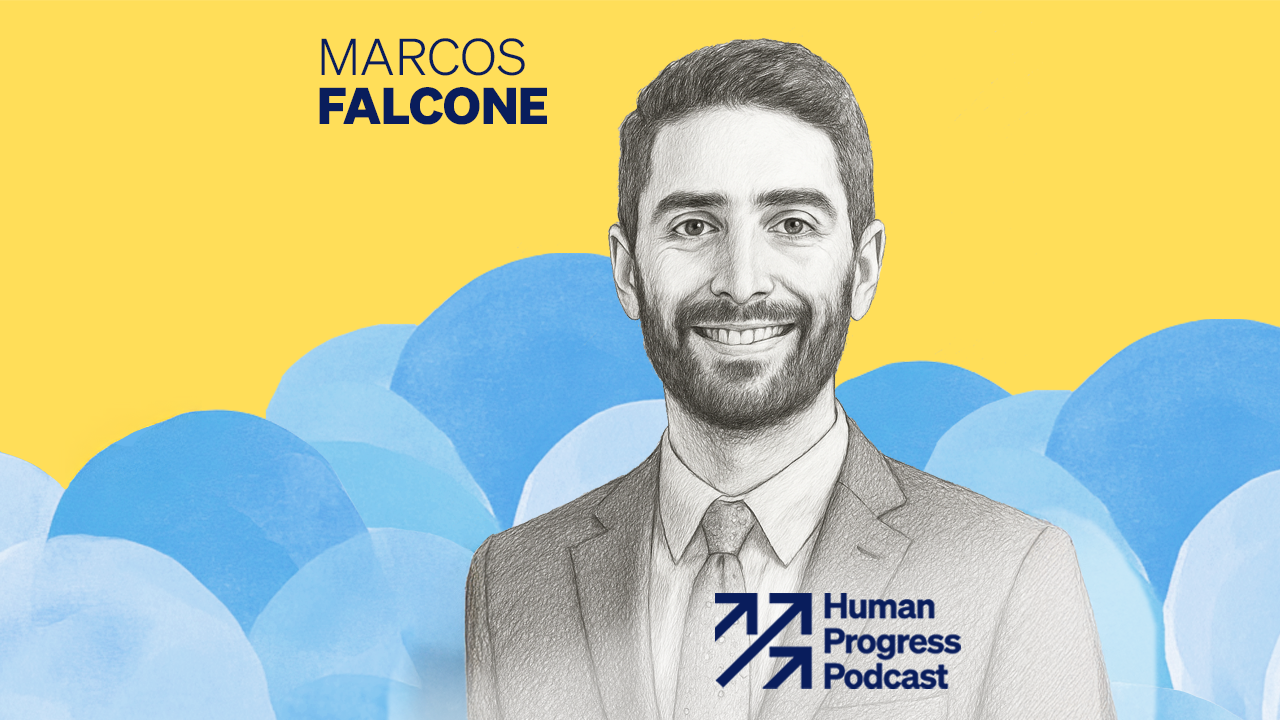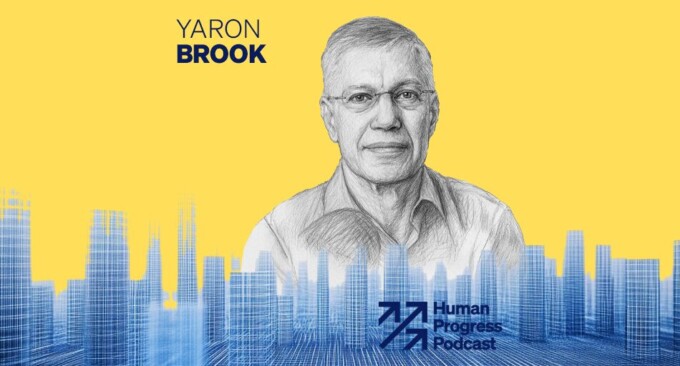Listen to the podcast or read the full transcript here.
Joining me today is my colleague Marcos Falcone, a policy analyst focusing on Latin America at the Cato Institute’s Center for Global Liberty and Prosperity. He joins the podcast today to discuss the dramatic recent election win of President Javier Milei, who has led his party to a landslide victory in Argentina.
Let’s start with a bit of a history lesson. Argentina has a long history that has not always been a history of progress. Could you walk us through some of that background?
Argentina is one of very few countries in the world, and perhaps the only one, to have gone from being a developed country to a developing country. During the late 19th and early 20th centuries, Argentina was among the richest economies in the world. It was second to the US in terms of the net number of immigrants received. It also had extremely low taxes, low public spending, and very few regulations.
But, of course, international ideological trends also affected Argentina. Nationalism, corporatism, and fascism began to rise in popularity, Juan Domingo Perón came to power in 1946, and Argentina started to diverge from the rest of the world. Whereas much of the world opened up to trade during those years, Argentina became a highly closed, protectionist economy and missed out on all the benefits of trade that increased dramatically after the end of the Second World War.
When Argentina became a closed economy, special interests began to emerge, including trade unions and crony capitalists, who depended on Argentina remaining a closed economy, which in turn made it harder to re-liberalize Argentina’s economy. Governments couldn’t, for example, lower public spending, because people were counting on it. They couldn’t open borders because industries were dependent on them being closed. They couldn’t deregulate labor relations because of the unions. And so, we started to drift into a declining path.
On a happier note, Argentina also has a very long intellectual tradition of classical liberal thought. Could you tell us about that?
The architect of the Argentinian constitution was a classical liberal called Juan Bautista Alberdi. He was a lawyer, but like many intellectuals of the 19th century he wrote about many things, including economics and moral matters. The constitution he designed, which closely followed the example of the US Constitution, went into effect in 1853. It has suffered changes, but really no major changes were implemented until the mid-20th century. So, for almost 100 years, Argentina retained this very classical liberal constitution that greatly benefited the country.
Liberty was also at the forefront of Argentina’s politics and culture. At the end of the 19th century, both the ruling elite and the opposition had classical liberal ideas. The socialists, for example, were very much against protectionism and the creation of a central bank, because they thought it would be bad for workers. However, as fascism and communism began to rise in popularity, this classical liberal environment started to fade away, to the point that we had a Supreme Court that basically allowed the military to seize power in 1930. From that point, it would be over 50 years before Argentina had a fully democratic regime once again.
Still, even during the 20th century, Argentina had a very strong classical liberal tradition. For example, Alberto Benegas Lynch, who is a Cato adjunct scholar, founded a university called ESEADE, where classical liberal thought was spread. We saw the founding of various think tanks in the 1980s and 1990s within the classical liberal tradition, such as my previous employer, Fundación Libertad. We began to rebuild the classical liberal culture that had been lost in Argentina for so long, which also contributed to the rise of Javier Milei, who started out speaking at forums at classical liberal think tanks. I actually met him over 10 years ago.
So, Argentina initially had a strong classical liberal tradition, which it lost for a while but has now regained. And that’s one of the reasons why I’m actually optimistic about the future of the country.
Let’s talk about Milei’s victory. Walk us through what was going on going up to the election and the election itself, and why that outcome took so many people by surprise.
Javier Milei won the presidency in 2023, when many people thought that was impossible. Politicians in other parties actually thought that they were taking advantage of Milei’s presence because he would take votes away from their opposition. But we have to understand the context of Argentina to understand why Milei became popular. In 2023, Argentina had an annual inflation of over 200 percent, on the verge of hyperinflation. And the country hadn’t grown in about a decade.
Everyone who wanted to do business in Argentina knew that this was next to impossible because of how regulated the economy was, and there were also unbearable situations in daily life. For example, rent control was so stringent that many landlords decided not to rent their places, and this caused prices to go up. Ryan Bourne and I interviewed one person who told us that back in 2023, it was so expensive to find a place to live that it could be cheaper to live in a hotel.
So Argentina had been trying interventionist policies for a long time, and they were not yielding good results, and Javier Milei arrives, wielding a chainsaw, saying, “we need to cut spending, we need to slash public spending, we need to lower taxes, we need to deregulate, we need to open up the economy, and we need to dollarize.” And after he wins the presidency, so many people say, “A libertarian can’t last long into office. He will have to resign after a month if he tries to do what he says.” And well, Milei has been president for almost two years now, and many of the radical reforms that he announced have not caused any sort of upheaval.
I think that the most important reform was balancing the budget. Argentina had a 200 percent annual inflation rate because it was running deficits, and nobody trusted Argentina to pay back its debt, so all the government could do was print money. In just one month after taking office, Milei had balanced the budget—something everyone else had said was impossible. Ten days into his presidency, Milei repealed the rent control laws. One year after that decision went into effect, we saw prices going down in real terms by about 30 percent. We saw the supply of apartments triple in the city of Buenos Aires.
During the 2025 midterm election a couple of weeks ago, there was some pessimism that maybe the Peronists were going to win. Many people, including political analysts, were saying that Milei’s changes were so profound that people would not tolerate them, and this fueled a run against the peso. But Milei won over 40 percent of the vote, and this is bringing a new wave of optimism to Argentina because, since Milei previously only had about 15 percent of seats, there were many reforms that he couldn’t make. Now, while Milei still doesn’t have a majority, he needs fewer alliances to pass the reforms that he wants.
Let’s talk about some of those policies.
It seems like the priorities of the Milei administration will be to pass tax reform, social security reform, and labor reform.
In Argentina, taxes are not just high, but also very complicated and superimposing, meaning you have taxes on taxes. To give you an example, the last Doing Business report by the World Bank, which came out in 2020, said that a business in Argentina that paid all of the taxes it was legally required to pay would end up paying 106 percent of its income. That means you’d be better off not doing any business at all. So, you can imagine how complicated the tax system is in Argentina, because obviously, businesses can’t pay 106 percent of their income. The Milei administration could only make very limited changes up to this point because, constitutionally, he needs Congress to legislate over tax matters.
Argentina also has a very high degree of informality in its labor market because it’s very expensive to hire employees legally, and it can be even more expensive to let them go because of litigation. Businesses, particularly small and medium enterprises, are constantly trying to avoid litigation because they know, due to the way that the judicial system is set up, if they face a lawsuit by a former employee, they’re going to lose. This needs to stop, and the Milei administration knows this and is going to push for labor reform.
When it comes to social security, Argentina has the common problem of an aging population. We have the typical Ponzi scheme, where if the base keeps growing, then there’s no issue, but if the population pyramid is no longer a pyramid, there’s likely not going to be enough people in the future to pay for those who are paying taxes today. Now, this is aggravated in Argentina’s case because of populist policies. For example, beginning in the 21st century, over a million pensioners were integrated into the system without having made any payments to social security beforehand at all. We’ve also had an increasing amount of fraud over the past two decades. It’s statistically impossible to have as many disabled people as Argentina seems to have. We see towns in Argentina in backward provinces where maybe 50 percent of all people are cashing in a disability payment. Those are the kind of things that the Milei administration will try to tackle.
I would also like to see more far-reaching trade liberalization and dollarization, because Argentina will eventually have another left-wing or Peronist administration. We’re in a democracy, governments change, and we haven’t really seen that the Peronist economic agenda is becoming more reasonable. So, we need to protect people, and particularly the assets of the people, and the best way to do that is dollarization.
Let’s talk a little bit more about dollarization because this is such an important policy issue in Argentina.
Milei promised to dollarize the economy back in 2023 in the context of near hyperinflation. Now, while annual inflation is still over 30 percent, the problem has become less salient, and it seems as though maybe you don’t need to dollarize if you can just get inflation back under control. But we have this problem, which we just saw before the recent elections, where whenever there’s uncertainty about the future in Argentina, you have a run against the peso, and people rush to buy dollars. This basically stops all economic activity because people don’t want to make decisions amid all the uncertainty. And what ends up happening is that the people who benefit are those with dollars, who are usually the richest ones, and the poorest suffer the most because they have the national currency that is constantly losing value. And in many cases, the people who have dollars don’t even invest them; they just keep the physical dollar bills, so this also takes money out of the financial system.
Argentines don’t need to live like this. We have seen examples of successful dollarization processes that have defended people against populist governments. Ecuador dollarized its economy 25 years ago, and after dollarizing, it had a left-wing administration led by Rafael Correa that lasted for ten years. Many people thought he could have been another Chavez. He wanted to turn Ecuador upside down and implement all sorts of interventionist policies. But the dollar was more popular than he was, and he couldn’t de-dollarize, so even though he did a lot of damage to the Ecuadorian economy, dollarization protected the value of their assets.
What are some of the potential implications for the broader region? Do you think that this renaissance of classical liberal or libertarian policy could catch on throughout Latin America?
I think Argentina could become an example that other countries in Latin America can imitate. In recent years, we have had different administrations in countries like Brazil, Chile, and Colombia that have gone left-wing, and in many cases, in more extreme ways than in the past. And in Latin America, presidents who are not left-wing tend to be more conservative or nationalistic. So, Argentina is relatively alone in the region, but I hope that Milei becomes a sort of beacon that can help libertarian politicians in other countries rise to prominence.
We are seeing that in Chile, where even though the most popular figure right now is a communist, you also have a libertarian candidate who might go to the runoff against the communist and potentially win. And that could undo a lot of the bad policies that Chile has recently engaged in.




